- Latest articles
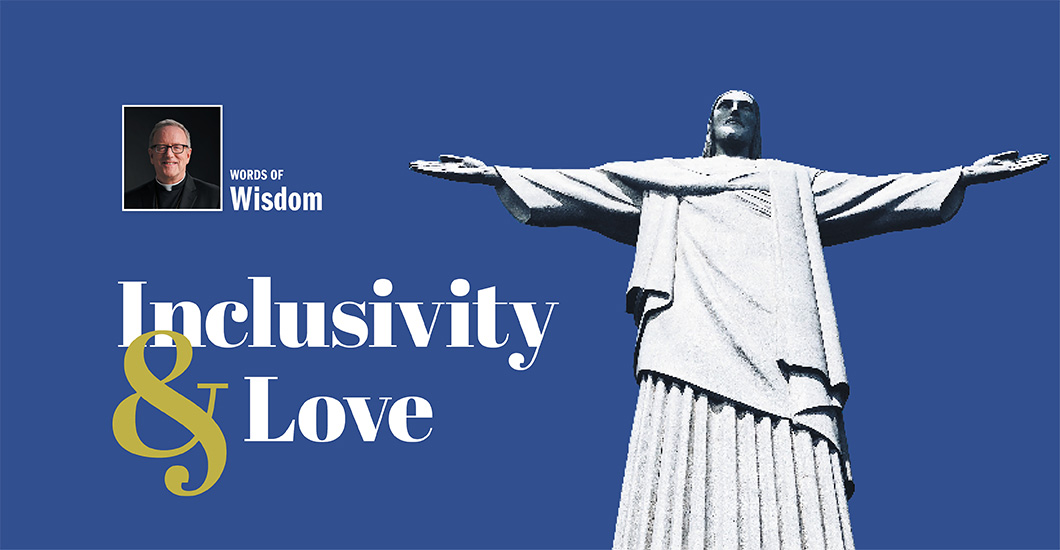
The other night, I had the privilege of participating in one of the listening sessions for the continental phase of the Synodal process. The basis for our discussion was a lengthy document produced by the Vatican after it had compiled data and testimony from all over the Catholic world. As I have been studying and speaking about synodality, I very much enjoyed the exchange of views. But I found myself increasingly uneasy with two words that feature prominently in the document, and that dominated much of our discussion— namely, “inclusivity” and “welcoming.”
Again and again, we hear that the Church must become a more inclusive and welcoming place for a variety of groups: women, LGBT+ people, the divorced and civilly remarried, etc. But I have yet to come across a precise definition of either term. What exactly would a welcoming and inclusive Church look like? Would it always reach out to everyone in a spirit of invitation? If so, the answer seems obviously to be yes. Would it always treat everyone, no matter their background, ethnicity, or sexuality, with respect and dignity? If so, again, the answer is yes. Would such a Church always listen with pastoral attention to the concerns of all? If so, affirmative. But would a Church exhibiting these qualities never pose a moral challenge to those who would seek entry? Would it ratify the behavior and lifestyle choices of anyone who presented him or herself for admission? Would it effectively abandon its own identity and structuring logic so as to accommodate any and all who come forward? I hope it is equally evident that the answer to all those questions is a resounding no. The ambiguity of the terms is a problem that could undermine much of the Synodal process.
In order to adjudicate this matter, I would suggest that we look not so much to the environing culture of the present day but to Christ Jesus. His attitude of radical welcome is nowhere on clearer display than in his open-table fellowship, that is to say, his consistent practice—countercultural in the extreme—to eat and drink not only with the righteous but
also with sinners, with Pharisees, tax collectors, and prostitutes. These meals of sacred fellowship Jesus even compared to the banquet of heaven. Throughout His public ministry, Jesus reached out to those considered unclean or wicked: the woman at the well, the man born blind, Zacchaeus, the woman caught in adultery, the thief crucified at his side, etc. So, there is no question that He was hospitable, gracious, and yes, welcoming to all.
By the same token, this inclusivity of the Lord was unambiguously and consistently accompanied by his summons to conversion. Indeed, the first word out of Jesus’ mouth in his inaugural address in the Gospel of Mark is not “Welcome!” but rather “Repent!” To the woman caught in adultery, He said, “Go and sin no more”; after meeting the Lord, Zacchaeus promised to change his sinful ways and compensate lavishly for his misdeeds; in the presence of Jesus, the good thief acknowledged his own guilt; and the risen Christ compelled the chief of the Apostles, who had three times denied Him, three times to affirm his love.
In a word, there is a remarkable balance in the pastoral outreach of Jesus between welcome and challenge, between outreach and a call to change. This is why I would characterize His approach not simply as “inclusive” or “welcoming” but rather as loving. Thomas Aquinas reminds us that to love is “to will the good of the other.” Accordingly, one who truly loves another reaches out in kindness, to be sure, but at the same time, he does not hesitate, when necessary, to correct, to warn, even to judge. My mentor, Francis
Cardinal George was once asked why he disliked the sentiment behind the song “All Are Welcome.” He responded that it overlooked the simple fact that, though all are indeed welcome in the Church, it is “on Christ’s terms, not their own.”
An overall concern that I have, very much related to the consistent use of the terms “welcoming” and “inclusivity,” is the trumping of doctrine, anthropology, and real theological argument by sentiment, or to put it a bit differently, the tendency to psychologize the matters under consideration. The Church doesn’t prohibit homosexual acts because it has an irrational fear of homosexuals, nor does it refuse communion to those in irregular marriage arrangements because it gets its kicks out of being exclusive; nor does it disallow women’s ordination because grumpy old men in power just can’t stand women. For each of these positions, it articulates arguments based on Scripture, philosophy, and the theological tradition, and each has been ratified by the authoritative teaching of bishops in communion with the pope. To throw all these settled teachings into question because they don’t correspond to the canons of our contemporary culture would be to place the Church into real crisis. And I sincerely do not believe that this shaking of the foundations is what Pope Francis had in mind when he called for a synod on synodality.
'
Many of us are familiar with the parable in the Gospel of Luke (Luke 18: 9-14) that dramatizes and contrasts the prayers of the Pharisee and the tax collector. When we compare their prayers, we might identify more with the prayer of the Pharisee who thanks God that he was not a sinner like the tax collector. Thinking ourselves generous, we may have prayed such a prayer without recognizing the self-righteous attitude and the sense of superiority embedded in that prayer. Jesus instead praises the humble prayer of the tax collector whose humility and honesty allows him to go home justified.
If we adopt the attitude of the tax collector, we won’t be likely to judge other people unjustly. If we sincerely see ourselves as the sinner we are, how could we pronounce the final judgment on another? Judging others’ final destiny comes from an attitude of superiority, a sense of pride that we might say was the first and greatest sin. Our Lord always leaves the door for mercy open until the final moment.
As we go through our day, do we stop to consider how many times we judge others based on exterior perceptions, whereas the Lord sees into their hearts? Do you ever find yourself condemning others when you are watching or reading the news? How often does a person’s race, religion, sexual orientation, or any other trait that is different from our own cause us to pass a negative judgment on them?
Unfortunately, many of us don’t realize the gravity of judging others while failing to closely examine our own actions and motivations. In the Gospels, Jesus embraces the outcasts and sinners. He shows love and acceptance toward those that the self-righteous Pharisees and the scribes rejected. The compassion Jesus had for sinners should fill our hearts-whenever we are dealing with those who are different from us or whose actions offend us.
When we humbly realize that we are indeed sinners, we will throw ourselves on God’s mercy and realize that the blood Jesus shed on Calvary was shed for us, for our enemies, and for those we are inclined to judge. They too have precious souls that Jesus longs to redeem.
When we pray for people, let’s first examine the attitude we have toward them. Is our attitude compassionate, or is it purely judgemental? A prayer that comes from a loving heart will be more fruitful than a prayer born of judgment.
Let us ask the Lord’s forgiveness for the times we have judged others unjustly and beg Him to bless us with a compassionate heart like His.
'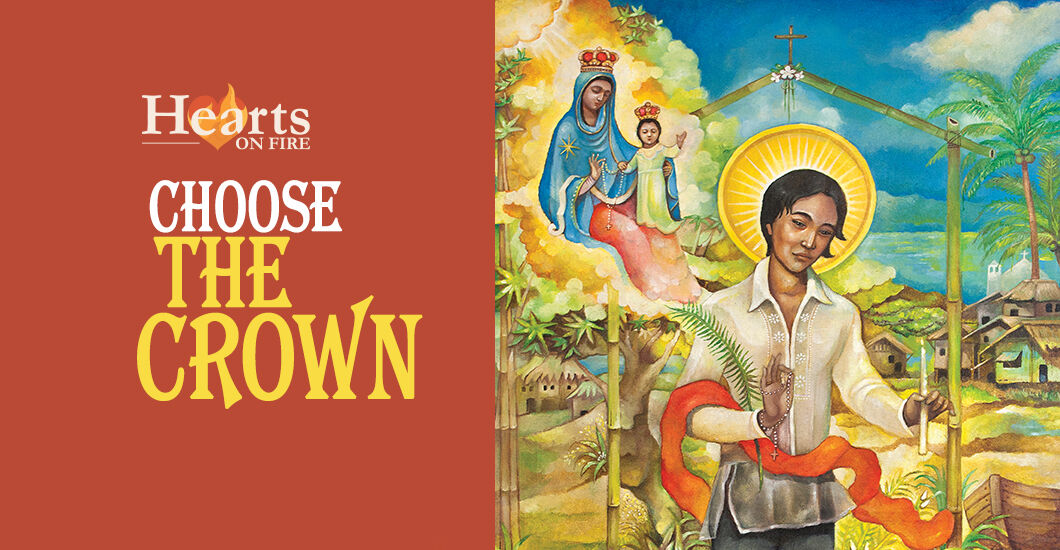
“I am a Catholic and I will die for God with a willing and ready heart. If I had a thousand lives, I would offer them all to Him.”
These were the dying words of a man who found himself in a situation where he could choose whether to live or die.
Lorenzo Ruiz, born in Manila in 1594. His Chinese father and Filipino mother were both Catholic. He grew up with a Dominican education, served as an altar boy and sacristan, and eventually became a professional calligrapher. A member of the Confraternity of the Most Holy Rosary, Lorenzo married and had two sons with his wife, Rosario.
In 1636, his life took a tragic turn. Falsely accused of murder, he sought the help of three Dominican priests who were about to undertake a missionary journey to Japan, despite the brutal persecution of Christians taking place there. Lorenzo had no idea until they had set sail that the group was heading to Japan and the danger that awaited there.
Fearing Spain would use religion to invade Japan as they believed they had done in the Philippines, Japan fiercely resisted Christianity. The missionaries were soon discovered, imprisoned, and subjected to many cruel tortures which included having huge quantities of water forced down their throats. Then soldiers took it in turns to stand on a board placed across their stomachs, forcing the water to surge violently from their mouths, nose, and eyes.
Finally, they were hung upside-down over a pit, their bodies tightly bound to slow circulation, prolong pain, and delay death. But one arm was always left free, so the victim could signal his intent to recant. Neither Lorenzo nor his companions recanted. In fact, his faith grew stronger as his persecutors interrogated him and threatened death. The holy martyrs hung over the pit for three days. By then, Lorenzo was dead and the three priests who were still living were beheaded.
A quick renunciation of their faith could have saved their lives. But instead, they chose to die wearing a martyr’s crown. May their heroism inspire us to live our faith with courage and without compromise.
'
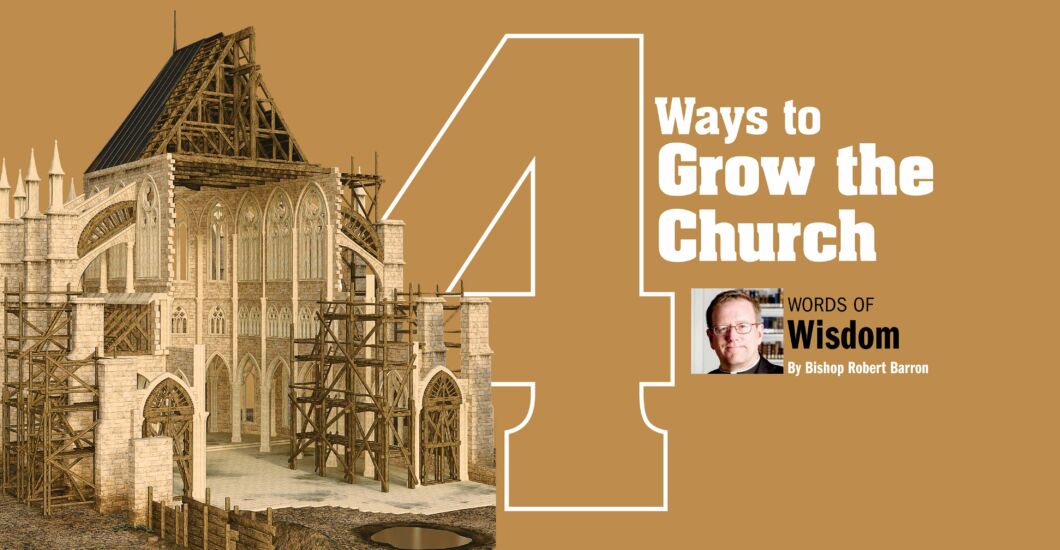
Last week, I met with the deans of our diocese to discuss a number of issues, the most prominent of which was the ongoing process of merging some of our parishes and reorganizing others into clusters. These moves, which have been happening over the past several years, are necessitated by a number of factors: the diminishing number of priests, demographic shifts in our cities and towns, economic pressures, etc. Even as I expressed my approval for some of these changes, I told the deans that, for every strategy of consolidation, I want a strategy for growth as well.
I simply refuse to accept the proposition that I, or any other bishop, should be presiding over the decline of our churches. By its very nature, Christianity is centrifugal, outward-tending, universal in purpose and scope. Jesus didn’t say, “Preach the Gospel to a handful of your friends,” or “Proclaim the Good News to your own culture.” Rather, he said to his disciples: “All authority in heaven and on earth has been given to me. Go therefore and make disciples of all nations, baptizing them in the name of the Father and of the Son and of the Holy Spirit” (Matthew 28:18–19). He also instructed his followers that the very gates of hell would not prevail against the fighting Church that he established. Therefore, maintaining things as they are, or managing decline, or treading water is absolutely not what Jesus wants or expects of us.
Permit me to say, right away, that the expansion of our Church is by no means the exclusive responsibility of bishops and priests. As Vatican II clearly teaches, every baptized Catholic is commissioned to be an evangelizer; so we’re all in this together. Therefore, what are some of the strategies of growth that can be employed by any Catholic? A first one I would highlight is simply this: every family that comes regularly to Mass should make it their evangelical responsibility to bring another family to Mass this coming year. Every faithful Mass-goer reading these words knows people who should be going to Mass and aren’t. They might be your own children or grandchildren. They might be coworkers who were once ardent Catholics and who simply drifted away from the practice of the faith, or perhaps people who are angry at the Church. Identify these wandering sheep and make it your evangelical challenge to bring them back to Mass. If we all did this successfully, we would double the size of our parishes in a year.
A second recommendation is to pray for the expansion of the Church. According to the Scriptures, nothing great is ever accomplished apart from prayer. So ask the Lord, insistently, fervently, even stubbornly, to bring back his scattered sheep. Just as we have to beg the harvest master to raise up workers to gather in his harvest, so we have to beg him to increase his sheepfold. I would encourage the elderly and the homebound in a parish to take on this specific task. And I might ask those who regularly do Eucharistic Adoration to spend fifteen or thirty minutes a day asking the Lord for this specific favor. Or I would suggest that liturgy planners include petitions for the growth of the parish in the prayers of the faithful at Sunday Mass.
A third enjoinder is to invite seekers to raise their questions. I know from lots of concrete experience over the past twenty years that many young people, even those who claim hostility to the faith, are actually deeply interested in religion. Like Herod listening to the preaching of John the Baptist in prison, even the seemingly anti-religious will go on religious websites and attend carefully to what is being discussed. So ask those who have disaffiliated why they no longer come to Mass. You might be surprised by how ready they are to tell you. But then, you have to have followed the recommendation of St. Peter: “Always be ready to give an explanation to anyone who asks you for a reason for your hope” (1 Pet. 3:15). In other words, if you elicit questions, you better be ready to give some answers. This means that you have to bone up on your theology, your apologetics, your Scripture, your philosophy, and your church history. If that sounds daunting, remember that in the last twenty-five years or so there has been an explosion of literature in just these areas, focusing precisely on the kinds of questions that young seekers tend to ask—and most of it is available readily online.
A fourth and final suggestion that I would make is simply this: be kind. Sherry Waddell, whose Forming Intentional Disciples has become a modern classic in the field of evangelization, says that a crucial first step in bringing someone to the faith is the establishment of trust. If someone thinks that you are a good and decent person, she is far more likely to listen to you speak about your faith. May I be blunt? Even the most casual glance at Catholic social media reveals a plethora of obnoxious behavior. Far, far too many seem intent upon trumpeting their own correctness, focusing on narrow issues that are unintelligible and irrelevant to most people, and tearing down their enemies. I fear that this reality on social media may be an amplification of attitudes in the Church outside of the digital space. These attitudes are inimical to evangelization. A colleague of mine has related that in his conversations with the alienated and unaffiliated that what keeps them away from the Church is their experience of what they describe as meanness from believers. So both online and in real life, be kind. No one will be interested in hearing about the faith life of obviously bitter and unhappy people.
So, we have our marching orders: proclaim the Lord Jesus Christ to all nations. Let us start with our own parishes, our own families. And let us never settle for maintenance of the status quo.
'

Let God write a beautiful story into your life
It was a beautiful summer day as we relaxed and chatted with friends while the children laughed and played in the creek. They proudly told us about their older son who had gone to Mexico to pursue his career in dentistry because it was much more affordable in their home country. Their son had told them about the new friends he was making. One of the girls he met astonished him by her behavior and attitude which didn’t quite match up with his conservative values, so he decided to step away from her. They were so proud of their son because he was able to perceive that it was not a good idea to pursue friendship or relationship with this girl. I could understand his caution, but I had a different perspective because I was once, ‘that girl’…
Growing Up
I was born in a small town in Quebec which was a great place to raise a family. Unfortunately, my parents divorced when I was only 2 years old, so I grew up with my mom and her partner, and only visited my dad once a fortnight. I always felt a lack of love and was not really introduced to Jesus. Although my parents were Catholics, and my mom made sure I received all my sacraments, she didn’t bring me to Sunday Mass, nor pray in the home, even the Rosary or Grace before meals. My faith was pretty basic. My father was Italian, but grew up in Canada. His mother was a devout Catholic and would never forget to pray every day. It’s a shame I didn’t follow in her footsteps…Yet God had other plans for me, I guess.
As I was growing up, I felt rejected by other kids because of my skin color. My mom is from Costa Rica so I wasn’t the typical French Canadian. However, I managed to make plenty of friends, although they weren’t all a good influence. As puberty hit, I developed into an attractive young lady who appeared much older than I was. I took advantage of this to become popular and had no problem getting boyfriends. My mom never really gave me the sexual education I needed and the environment I was living in was not a conservative one. As time went by, I suffered deception after deception. I felt empty. My “joy” was always temporary and soon enough, I ended up in someone else’s arms.
Search for Love
When I finished high school, I decided to take a year off and go to Costa Rica to live with my aunt before I started college. Since I already had a part-time job to buy my own fashionable clothes, make up, perfume etc, I saved money to fund the trip and learn Spanish in an academy. I arrived during the holiday season, so lots of festivities were taking place. Since my relationships with men were always ending badly, I had decided (at 18) that I was through with men. I resolved to spend time with family instead, but God, had other plans for me…
Five days after my arrival, my cousin took me to a restaurant-bar where he was meeting some friends. As soon as we sat down, a very handsome guy smiled at me. I blushed and smiled back. He asked if he could join us, and I accepted with pleasure. We both felt an immediate bond and arranged to meet again the next day, and the next, and the next and so on. Despite our cultural differences, we had so much in common and we were able to connect in a way we could not imagine. He told me, “What matters most to me is what’s in your head and what’s in your heart.” Nobody had ever said anything like that to me before.
William and I became inseparable. He even invited me to go to Mass with him before we went somewhere. Although I didn’t really pay attention, it still pleased me because I was with him. Then he invited me to go on a pilgrimage with his family to the basilica of Cartago that involved 4 hours of walking. Again, I didn’t really go because of my faith.
A Heart Poured Out
I was amazed to see thousands and thousands of people coming to the church, asking the Blessed Virgin Mary for a favor, or giving thanks for the favors they had received. It was incredible. Every one of them would enter the church, kneel down and walk on their knees all the way down the aisle until they reached the altar. When our turn came, I was feeling perfectly fine, but as soon as I knelt down, I felt like I was out of air. A big knot formed in my throat and I exploded in tears. I wept like a baby all the way to the altar. William looked at me, wondering what was happening, but didn’t say anything. Once we were outside again, his mom, Sandra asked me what had happened. “I don’t know,” I gasped. She said that Jesus had come to visit my heart. I knew she was right. It was like meeting someone you loved deeply after a long separation. Something supernatural, beyond my control, was taking over me.
From that moment on, I felt like a new person and my life was starting afresh. William took me to Confession for the first time since my Confirmation at 11 years old. My list was so long…I think the priest wanted to retire after hearing my confession. We have a lot of work to do he said!
William and I married 4 years later and God has blessed us with 3 beautiful boys. In 2016 we consecrated our family to the Immaculate Heart of Mary. My faith has continued to grow. I started serving the Church in various ministries: most recently as a catechist. God has truly spun my life in a different direction. He continues to polish my soul, crafting me into His masterpiece. Even the challenging times are part of His plan. When I embrace my cross and follow Him, He leads me towards His kingdom. Jesus chose me to serve as He did.
When I offer up little annoyances and humiliations in sacrifice to Him, He changes them into something more beautiful than I could ever imagine, as He has changed me.
As I reflected on what my friends had said, I thought of the old me, how lost I was, and how completely God transformed my life through the catalyst of meeting William. I advised them to encourage their son not to reject a friendship too hastily, but to let God’s light shine into their soul. Maybe God has a plan…
'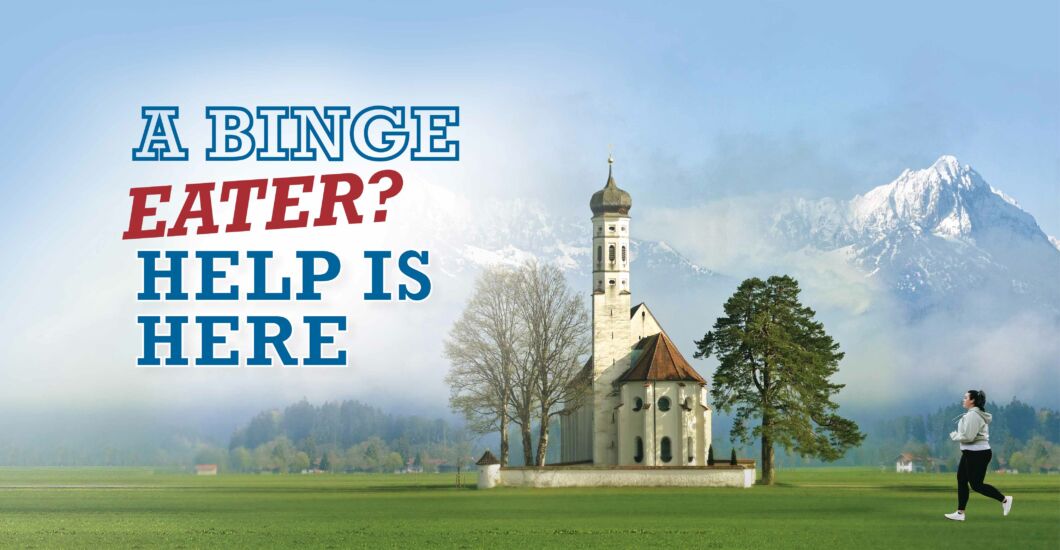
Overwhelmed by the uncertainties in life? Take heart. I was once there too—but Jesus showed me a way through
I was thirty-something, strolling through downtown in the dress I loved, an airy sky-blue print. Its shape flattered me I thought, so I wore it often. Without warning I suddenly glimpsed my reflection in a store window. Revolted, I tried to suck in my gut. It wouldn’t suck. It had nowhere to go. Bulges everywhere. Beneath the hem, my legs were hams. I loathed myself.
Carefree
My eating and weight were skyrocketing out of control; and beyond that, my entire life was a train wreck. Divorce had recently shredded my brief marriage. Externally I pretended everything was fine, but inside I was shattered.
Isolating behind walls of fat, I shared my anguish with no one. To numb my pain, I drank alcohol, worked, and ate—excessively. Successive dieting attempts only plummeted me into another cycle of obsession, self-pity, and compulsive binging.
And, beneath all that rubble, spiritual problems festered. I still called myself Catholic, but I lived like an atheist. To me, God was ‘up there’ all right, but far away and caring nothing about my miseries. Why should I trust Him in the slightest? I showed up at Sunday Mass only when visiting my parents, to deceive them into believing I practiced faithfully. In truth, I bulldozed through my days with no thought of God and went ahead doing whatever I pleased.
But the chilling memory of my reflection in that window haunted me. A new restlessness gripped my soul. Change was needed, but what? I had no idea. Nor did I have any idea that God Himself was moving in that moment, beginning to expose the ache in my heart with His gentle fingers.
Contending with Goliath
A woman at work expressed discouragement about her eating and weight, and we connected. One day she mentioned a twelve-step group she’d begun attending. The group asserted that because disordered eating is related to our emotional and spiritual lives, losing weight and keeping it off needs to address these components as well. This integrated approach appealed to me. Despite my scorn for groups, I tried some meetings. Soon hooked, I attended regularly, and though I rarely spoke up in the meetings, afterwards I would experiment with some of the ideas I heard. This approach worked somewhat, and after a few months I was elated when my weight began to drop. However—though I admitted this to no one—I was contending with a vicious Goliath, one which threatened to destroy my progress.
While at work each day, I followed a food plan that allowed me to eat moderately and to minimize temptations. But by 5:00 p.m. each day I was famished. I’d rush home and fly into a rampage, stuffing my face nonstop until I collapsed into bed. Powerless over this beast, and terrified that pounds would soon be piling on, I was disgusted with myself. What was I to do? I hadn’t a clue. The bleak pattern dragged on, and hopelessness gripped me.
An Idea Popped Up
Then unexpectedly the most outlandish thought popped into my head. Instead of going straight home from work, I could hit the 5:15 p.m. Mass. That would at least postpone my binge and reduce its duration by one hour. At first this idea seemed pathetic. Wasn’t it stop-gap and preposterous? But, with no other options in sight, desperation prompted me to try it. Soon I was attending Mass and receiving Holy Communion daily.
My one goal was to reduce my binging. Apparently, that was enough for Jesus. Truly present in His Body and Blood, He was waiting for me there, and glad to have me back. Only much later did I realize that He had an agenda in all this too: one unfathomably higher, wider, and deeper than my own. He knew precisely what I needed and how to provide it.
With tender care, he used my despair to draw my faltering feet onto solid ground and began what would be a lengthy process of healing my heart and connecting it with his own. At Mass each day, feeding me His very own Body and Blood, He began to remedy my ills, bathe me in supernatural graces, radiate light into my darkness, and equip me to combat evils that threatened me.
Freedom at Last
His Eucharistic graces ignited and invigorated me, and I upped my program participation to a new level. Earlier I had dabbled; now I jumped in with both feet, and as the days passed, I found two gifts which proved to be indispensable: a supportive community that stuck with me through good days and bad, and an arsenal of practical strategies. Without these, I would have lost heart and given up. But instead—over a long period, as I learned to let Jesus be for me the Savior He had died to be, as my twelve-step friendships enriched and strengthened me, and as I employed the tools and wisdom I was given, I found freedom from my disordered eating and a stable and lasting recovery plan which continues to this day.
In this process, faith that was once only in my head shifted to my heart, and my false image of a remote uncaring God crumbled to smithereens. Jesus, Blessed Savior who continues to draw me closer to Himself, turned so much of my bitter into sweet. To this day, as I cooperate, He continues to transform other pits and waste lands that prevent me from flourishing.
What about you? What impossible hurdles are you facing today?
Whether you are troubled about your eating, anguished about a loved one who has left the faith, or crushed by other burdens, take heart. Embrace Jesus in the Holy Eucharist and in adoration. He is waiting for you. Bring your ache, your bitterness, your messes to Him. He yearns to come to your aid just as He rescued me in all my distress. No problem is too great or too little to bring to Him.
'
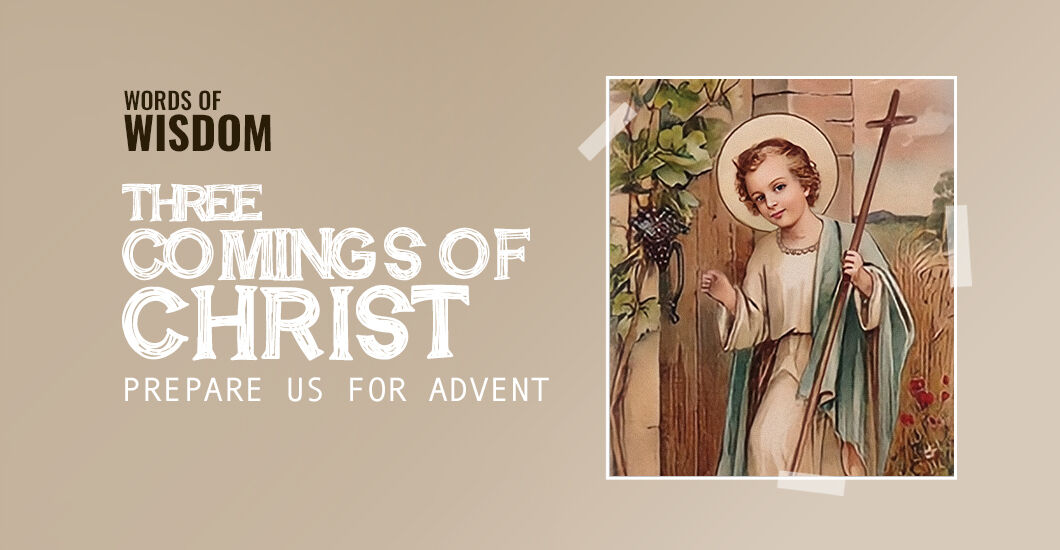
Many years ago, in the context of a high school religion class, a very wise Benedictine nun gave me a template for understanding Advent that I’ve never forgotten. It is simply that Advent calls to mind three “comings” of Christ: the first in history, the second now, and the third at the end of time. Meditating upon each of these is a helpful preparation for the holy season upon which we are embarking.
Let us first look back. Fulton Sheen said that Jesus is the only religious founder whose coming was clearly predicted. And indeed we can find throughout the Old Testament indications and anticipations of the arrival of the Messiah. How often the New Testament authors use the language of fulfillment and insist that the events around Jesus occurred “kata tas graphas” (according to the Scriptures). They appreciated Jesus, this particular figure from two thousand years ago, as the one who brought to full expression all of the institutions of Israel. His rising from the dead demonstrated that he is the New Temple, the New Covenant, the definitive prophet, the Law or Torah in person. Furthermore, they understood that Jesus had brought all of history, in a very real sense, to its climax. The turning point of the human story is not, therefore, the emergence of modernity, not the revolutions of the eighteenth century, but rather the dying and rising of Jesus, the Messiah of Israel. If we turn Jesus into a mythic or legendary figure or we construe him simply as an inspiring religious teacher, we miss this crucially important truth. Every single New Testament author witnesses to the fact that something happened in connection with Jesus, indeed something so dramatic that all of time should be understood as falling either before him or after him. And so, during Advent, we look back with deep interest and spiritual attention to that first coming.
Christ came in time, long ago, but we must attend to the second dimension of Advent—namely, his coming to us in the here and now. We might think of that famous painting of Jesus knocking at the door. This is the Christ who presents himself every day, seeking entry into our hearts and minds. In his first coming, he appeared in the context of Israel. In this present-day Adventus, he appears through the sacraments of the Church, through good preaching, through the witness of the saints, through the Eucharist especially, and through the poor who cry out to be cared for. We recall his words, “Whatsoever you do to the least of my people, you do to me.” Now just as many rejected him when he came in history long ago, so, sadly enough, many reject him today. Can we see that the most important decision we will ever make—more important than decisions regarding job, family, livelihood, etc.—is whether we allow Christ to become the Lord of our lives? During the season of Advent, we are meant to stop and pay close attention. How is Jesus coming to us and how, precisely, are we dealing with his arrival?
And finally, Advent calls to mind Christ’s definitive coming at the end of time. One of the peculiar marks of Christianity is the belief that time is going somewhere. It is not just “one damn thing after another,” as the cynical adage famously has it, nor simply an endless cycle, nor the “eternal return of the same.” Rather, time has a direction, moving toward its consummation, when God will be all in all. The Church identifies this final culmination as the “second coming” of Jesus, and the Gospels speak of it often. Here is just one example from the Gospel of Luke: “Jesus said to his disciples: ‘There will be signs in the sun, the moon, and the stars, and on earth nations will be in dismay. . . . People will die of fright in anticipation of what is coming upon the world. . . . And then they will see the Son of Man coming in a cloud with power and great glory.’” What this remarkable language conveys is the conviction that, at the close of the age, the old order will give way and God will renew the great structuring patterns of reality. At this second coming of Christ, all of the seeds that had been planted throughout nature and history will bear fruit, all of the latent potentialities of the cosmos will be actualized, and God’s justice will cover the earth as the waters cover the sea.
The Church’s belief—and it governs the whole of its life—is that we are living in the in-between times; that is to say, in between the culmination of history in the cross and Resurrection and the definitive fulfillment of history in the second coming of Jesus. In a sense, the war against sin and death has been won, and yet mop-up operations continue. The Church lives in that middle zone where the final stage of the battle is still being fought. Pay attention, especially during the Advent season, to our daily Gospels at Mass. I think you’ll be surprised how often they reference the second Advent of Jesus at the end of time. I might offer just two well-known examples: “We proclaim your Death, O Lord, and profess your Resurrection, until you come again,” and “As we await the blessed hope and the coming of our Savior, Jesus Christ.” This is the how the Church speaks during the in-between times. Though we are beset on all sides by failure, pain, sin, sickness, and the fear of death, we live in joyful hope, for we know that history is going somewhere, that God has won the decisive battle and will win the war.
Therefore, this Advent, look back; look around; and look forward. With each glance, you will see the Christ who comes.
'
Standing at the crossroads can be daunting, but help is only a prayer away…
When I was only eleven, my life was changed forever by a severe leg injury. Without reconstructive plastic surgery, I would have been permanently crippled. My admiration for my plastic surgeon fuelled my desire to follow in his footsteps so I could also help people in need. Performing reconstructive surgery in private practice and on medical missions satisfied this desire and I wasn’t keen to give it up as retirement loomed.
Long before I retired, I was already making plans to continue my missionary work and I also planned to volunteer as a hospital chaplain. Unfortunately, the Corona Pandemic threw a wrench in my plans. However, I remembered that Einstein once said, “When you stop learning, you start dying,” so I resolved not to fall into the temptation to become a couch potato.
I decided to take a spiritual guidance course. I soon realized that I had been looking for what I wanted to do, and not what God had in mind for me. Once I understood this, it didn’t take long for Him to answer my prayers for guidance and enlightenment. I received an email from the Sacramento Life Center, looking for a volunteer medical advocate and have been enjoying this work for the past year.
Volunteer medical advocates help out with a number of simple, but important tasks for patients in hospitals. Often, patients are just looking for a non-judgmental ear. Maybe they feel lost and are looking for information on referrals or other services. Sometimes they need some help getting basic baby needs such as diapers, baby wipes, formula, clothes, car seats, stroller, etc. Sometimes, they are simply searching for answers. The confusion and distress that patients experience when these needs aren’t met adds to their pain, and hinders their recovery, so these volunteers have a crucial role.
During my medical career, I had the opportunity to save and transform lives. Being an advocate can be just as rewarding. Sometimes, I meet people who are contemplating abortion. It is amazing what reviewing a little pregnancy physiology can do, especially if they think of the unborn child as a blob of tissue. When the sperm and egg unite, a new life begins. This is one of God’s greatest miracles. Only six weeks after fertilization, the patient can see and hear the unborn child’s heart beating through ultrasound. I show them life-size embryo models, as we marvel over the baby’s growth and development. “WOW, look at his eyes and ears and his little nose and mouth! His hands and feet have tiny little fingers and toes.”
Potentially, I could save three lives in one visit. Conflicted feelings after abortion can lead to suicide or broken relationships. The information and advice I provide, often leads to decisions that lead to life instead of heartbreak and guilt. When an abortion-minded couple comes into the clinic, but leaves having chosen life, I feel warm and bubbly inside. I thank God for His gifts and blessings that have allowed me to do His work.
'

Ever wondered what is the shade of a soul? Let me share what God infused into my mind while journaling…
I am a believer in Journal Writing. I believe everyone can write. If you can think and speak, you can write since writing is just talk written down. But I have been taught a new lesson recently. Pen or pencil in hand (or keyboard), as you draw down those thoughts, worries, and trivia in your mind, another Voices can be heard. Sometimes, God can speak to you through you!
I have a morning routine of reading from three daily devotionals after attending mass. I love God’s Word and I know it is living and active, so when a Scripture quote “speaks” to me, I write it down in my journal. Then I might write down my own thoughts.
On June 24, 2021, I was doing just that. I was feeling very bothered by all the divisions in our world. This group versus that group kind of thinking, and bickering seemed to be all about. I felt that mankind had so more to unite us than divide us. I picked up my pen and started to write. I wrote for about 15 minutes without stopping. I wrote in poetic form as well which is very rare for me. The writing just flowed and I let it. Then it was over and it was complete. God seemed to be confirming what I had thought about mankind’s connections. He gave me the reason for that connection. He even gave me the title — “What Color is a Soul?”
According to the Catechism of the Catholic Church, “The human soul is created directly by God and is not “produced” by the parents. (CCC 366-368, 382) Saint Hildegard of Bingen said, “The soul speaks: I am called to be the companion of angels, because I am the living breath God sent forth into dry clay.” Again, we find in the Catechism, “The soul causes the material body to be a living body.” (CCC 362-365,382)
Now, my journal writing did not include references to the Catechism of the Catholic Church, but I include them because they support what was given. But let’s go on with the entry:
God goes about picking up and mixing the earthen blend of the dry dirt. When He has just it just right, He puts in the perfect part—the God part. Does He wrench it from His own Sacred Heart? With the God part in, God bestows a Breath and perhaps a kiss. And a new creation is sent to earth. Every human being is created with a soul. No one is alive without one. No exceptions ! Doesn’t this unite every being on the planet? We know also that this soul never dies. The flesh decays, the God part lives on. It is the eternal life given by the Father.
Now our God loves variety. He didn’t just create “flowers”. He created every form, color, size, variety, function, perfume of flowers. Pick any form of creation animal, mineral, celestial, etc and you will find myriad expressions of each. God’s imagination is well, Godly. And all He creates is good. So we know the soul-bearing human is created in every color, size, shape,gift and grace. In every part of the globe, humans are connected by God’s amazing gift of our souls.. What color is a soul? It is not black, white, red, brown, yellow, etc. Our Artist in heaven gathers all shades of the universe. In His Image, He colors us majestic and grand. Each of us are meant to sparkle and shine. Don’t you think that it’s a sacred sign that we are innermost Divine. What color is a soul? It is Divine!
That journal entry calms and comforts me. It tells me that God is in control and He wants me to trust Him. My Savior knows my thoughts! The wisdom in the words was not my wisdom. I had been seeking an answer, and it was given. I feel that God wrote to me, through me, after my prayer. The Presence of God is ever with us and within us. God speaks to us through other people and the beauty of nature around us. He talks to us through our laughter, our music and even our tears. Many times we just don’t notice, but what about the times we do notice? Do we think ourselves out of that holy moment? When our thoughts are confirmed, or when our readings answer a question that has been on our minds or when we are “taught” as I was, do we tell someone about it? We need to share these encounters with our living God more often. It makes the Kingdom of God present on earth when we do. How much God loves us! Each of us is a beloved child of our good God. We don’t earn His love. We can’t lose it either. Therein lies the greatness of our merciful God.
Read Scripture. Pray. Meditate. Write. God can write to you, through you! Oh, and remember journal writing is unedited writing. Don’t stop to check spelling. Don’t wait for the perfect sentence to begin. Just write! You never know what God has to say to you.
'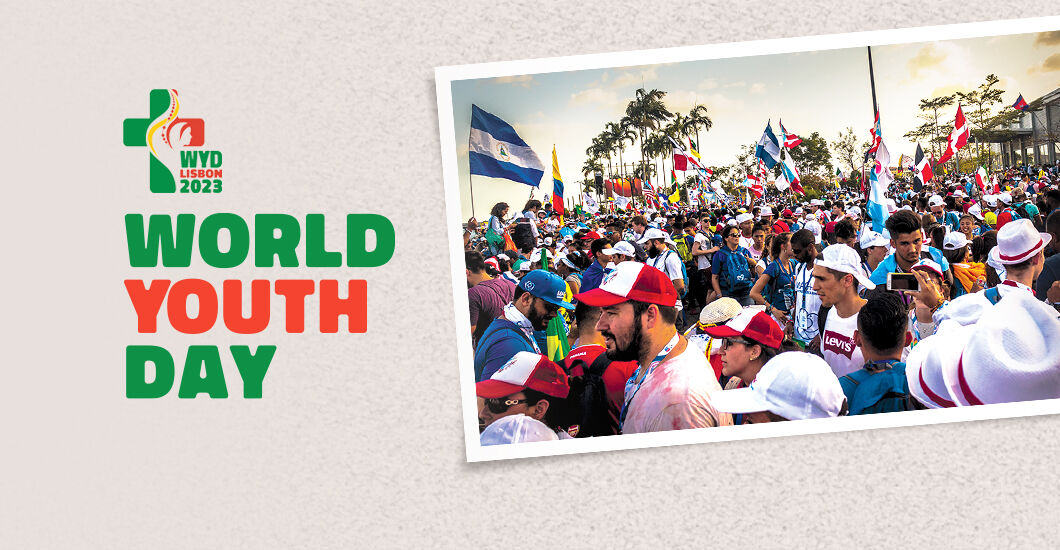
Heard about World Youth Day? Sister Jane M. Abeln prods you to take a chance and experience this unbelievable celebration that brings Heaven to earth
From the day Pope John Paul II appeared as the new Pope with the words, “Be not afraid!”, I greatly admired and followed him. He inspired my work with youth, for whom he had a special charism. In 1984 and 1985, he issued a special invitation for youth to join him in Rome on Palm Sunday. This was so successful that he expanded it into a “World Youth Day” (or rather week) which now occurs in different nations around the world every two years.
A Polish-born journalist shared a marvelous insight into how Pope JPII evolved the idea of World Youth Days. “In Communist Poland, he had to find ways of helping Catholics express their faith. Every year, he organized pilgrimages to Jasna Gora (Shrine of the Black Madonna), for August 14-15. He discovered how greatly these built relationships and strengthened faith in his people.”
Although I am no longer a youth or young adult, God in His Providence made it possible for me to attend the North American World Youth Days. World Youth Day is designed for the 16-35 age group, but priests, religious, families and older chaperones are also welcome. With less than a year to go for the August 1-7, 2023 World Youth Day in Lisbon, Portugal, I share my experiences to inspire you to join the pilgrimage, to support others to attend and to join them in prayer.
WYD 1993, Denver, Colorado, USA
With Pope John Paul II coming to Denver in 1993 for the first World Youth Day in the USA, I began planning a local event in our archdiocese to tie in with it. When it fell through, I read about a surplus “packet” offered by Salesians at a bargain price, which included the round trip flight and hotel, and arranged to go with a local youth group.
The motto of Denver World Youth Day was: “I have come to bring you life—abundant life” (John 10:10).We felt it enfolding us from the very moment we arrived to hear the airport filled with the joyful sound of young adults singing to the Lord in languages from around the globe. That continued through the catechetical days. The cheerful enthusiasm of the young people and their chaperones was like a foretaste of Heaven as they laughed, shared meals, smiles and deep conversations. Wherever they went, they sang, danced and chanted while they waved their banners and flags in the streets. Grace flowed as people flocked to receive the Sacrament of Reconciliation, pray around the clock at Eucharistic Adoration and gather for reverent, prayerful Masses. When Pope John Paul arrived, he was greeted by applause and animated voices chanting, “John Paul II, we love you.”
The culminating World Youth Day began with a pilgrimage on foot to the venue of the final Mass. Pilgrims could walk 15 miles, or take the trolley and walk just 3 miles. I chose the latter on the 90ᵒ F day, but after Vespers service with the Holy Father, the field at Denver’s mile-high site dropped to 40ᵒ. Although I nearly froze because I didn’t bring the warm clothing advised, I was entertained by the Spanish and French youth who danced all night. The dawning of a new day, returned warmth to our bodies as we emerged from our sleeping bags to prepare for the final Mass. This was so beautiful that tears of joy streamed from my eyes as I prayed in union with so many young people filled with hope for the future.
In a riveting homily to the millions gathered before him, Pope John Paul II challenged us to be active in promoting a “Culture of Life” to counter the devastation being wreaked by the “Culture of Death” which promotes contraception, abortion, euthanasia, divorce, despair and suicide. This call would inspire the formation of many new apostolates including “Crossroads” which began at the Franciscan University of Steubenville, and has expanded into annual pro-life summer pilgrimages in 3 countries, publicly witnessing to the communities they pass through, as they make prayerful sacrifice for them.
WYD 2002, Toronto, Canada
In 2002, I was blessed to be sponsored to attend Pope John Paul II’s final World Youth Day in Toronto, Canada. Although the Pope was now bent with age, and shaking with Parkinson’s disease, he still had the capacity to invigorate and inspire a new generation to carry on the mission. Although Sunday started with a downpour, I clung to a hope that it would clear. The Gospel came from Matthew 5. Just as the words, “You are the light of the world,” (Mt 5:14) rang out through the stadium, the sun broke through the clouds.
The Pope’s homily came straight from his Shepherd heart: “Jesus Christ is the Light in the world’s great darkness. Don’t get caught in the darkness. Although I have lived through much darkness…I have seen enough evidence to be unshakably convinced that no difficulty, no fear is so great that it can suffocate the hope that springs eternal in the hearts of the young.”
He directly addressed the sex-abuse scandal that had just broken out: “Don’t be discouraged by sins of darkness, even in priests and religious. BUT [he shouted] remember the many good priests and religious whose only desire is to serve and do good.” He encouraged the youth to follow religious and priestly vocations—“the royal road of the Cross” on which, in difficult times, “the pursuit of holiness becomes even more urgent.” Many vocations were born that year.
When our Holy Father announced the next site as 2005 in Cologne, Germany, he added, “Christ will meet you there.” My heart skipped a beat and tears filled my eyes, because he usually said, “I will meet you there.” I knew, we all knew, that he knew his final days were at hand.
2005 and beyond
In August 2005, I sat with my dying Dad watching on television as Pope Benedict sailed down the Rhine River to meet the world’s youth in Cologne. It amazed me to realize that the Pope who succeeded Pope John Paul II was a native of the country already chosen for the next World Youth Day! A similar thing happened in 2013. As youth from every continent, except Antarctica, prepared for World Youth Day in Rio de Janiero, Brazil, Pope Benedict resigned, and was succeeded by Pope Francis from the continent already chosen. Pope Benedict and Pope Francis both totally embraced the legacy of their predecessor and World Youth Day continues to inspire youth to follow the path of holiness.
WYD 2023, Lisbon, Portugal
Young people from all over the world are now planning to travel to Lisbon for the next World Youth Day. The host country is planning for Days in the Diocese across Portugal for youth to experience their culture, and they have an enticing program packed with talks, workshops, and events from some of the Church’s best preachers, musicians, and artists. Local families, schools and parishes are preparing to accommodate the many young pilgrims. The Sacrament of Reconciliation and Eucharistic Adoration will be everywhere and teams are already praying for the expected visitors. Pilgrimage groups are forming in nations around the world, and parishes are fundraising to assist their youth to attend. If God is calling you there, He can help you get there, and sustain you on life’s journey. It’s one of the treasures of the Catholic Church in our time. (See your diocesan website, and YouTube and Facebook for the official promo, song in 5 languages, logo, and scenes).
Those who can’t attend can participate in some events via social media, and pray in union with the pilgrims.
'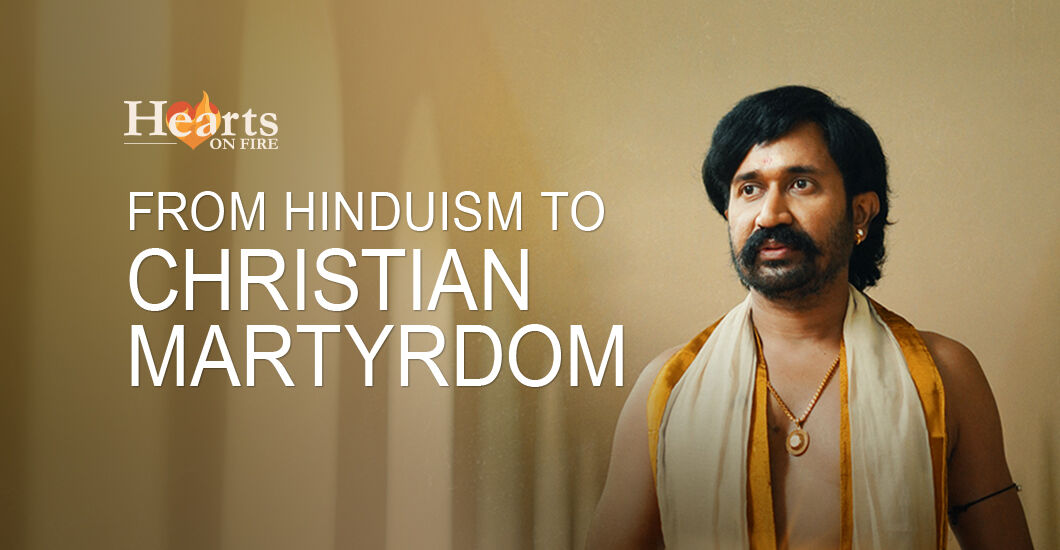
Nilakandan Pillai was born into a Hindu family in South India in 1712. His parents were devout upper caste Hindus. Nilakandan’s family was closely associated with the Royal Palace, and he served the King of Travancore as a palace official in charge of accounts.
In the Battle of Colachel, fought in 1741 between Travancore and the Dutch East India Company, the Dutch naval commander Captain Eustachius De Lannoy was defeated and captured by the King. De Lannoy and his men were later pardoned and served the Travancore army. Official work brought Nilakandan and De Lannoy together and a close friendship formed between the two.
During this period, Nilakandan faced many misfortunes, and was beset with doubts and fear. De Lannoy consoled his friend by sharing his Christian faith. The story of Job from the Bible greatly comforted Nilakandan, and their conversations drew him to Christ. Nilakandan decided to receive baptism, though he knew this decision would mean sacrificing his social status and the service of the King. On 14th May 1745, at the age of 32, Nilakandan was baptized into the Catholic Church, taking the name Devasahayam, the Tamil rendering of the biblical name Lazarus.
Devasahayam experienced immense joy in living his faith and strived to be a true disciple of Jesus. He thanked God every day for the grace of conversion and eagerly shared his Catholic faith with others. He soon persuaded his wife and several of his military colleagues to confess their faith in Christ. Devasahayam had no regard for the caste system and treated the so-called “low caste” people as equals.
Soon the palace officials who opposed his newfound faith turned against him. They conspired to have him arrested. The King asked Devasahayam to renounce his Christian faith, and promised him a prominent position in his court. But despite the allurements and threats, Devasahayam stood firm in his faith, which further enraged the King. Regarded as a criminal, Devasahayam endured inhuman tortures for the next three years. He was whipped daily, and endured having chili powder rubbed onto his wounds and into his nostrils. Given only stagnant water to drink, he was paraded around the Kingdom on a buffalo with his hands tied behind him — an infamous punishment reserved for traitors and meant to discourage future conversions. Devasahayam endured the humiliation and torture with great patience and trust in God. His gentle and kind demeanor surprised the soldiers. Every morning and night he spent time in prayer, and continued preaching the Gospel to all who came to listen.
The ministers who had conspired against Devasahayam obtained permission from the King to execute him in secret. On 14 January 1752, he was then taken to a deserted mountain to stand before a firing squad. Devasahayam’s only request was for time to pray, which the soldiers granted. As he prayed, shots rang out and he died with the names of Jesus and Mary on his lips.
Devasahayam was declared a Martyr and Blessed on December 2, 2012. In February 2020, Pope Francis recognized a miracle attributed to the intercession of Devasahayam, and on May 15th, 2022, he was canonized, becoming India’s first layperson to be declared a saint.
Shalom World has made a program based on the life of this great saint, whose courageous witness and martyrdom continues to inspire the faithful of today.
To learn more about St. Devasahayam, watch the episode of ‘Glorious Lives’: https://www.shalomworld.org/episode/indias-first-layman-martyr-saint-st-lazarus-devasahayam